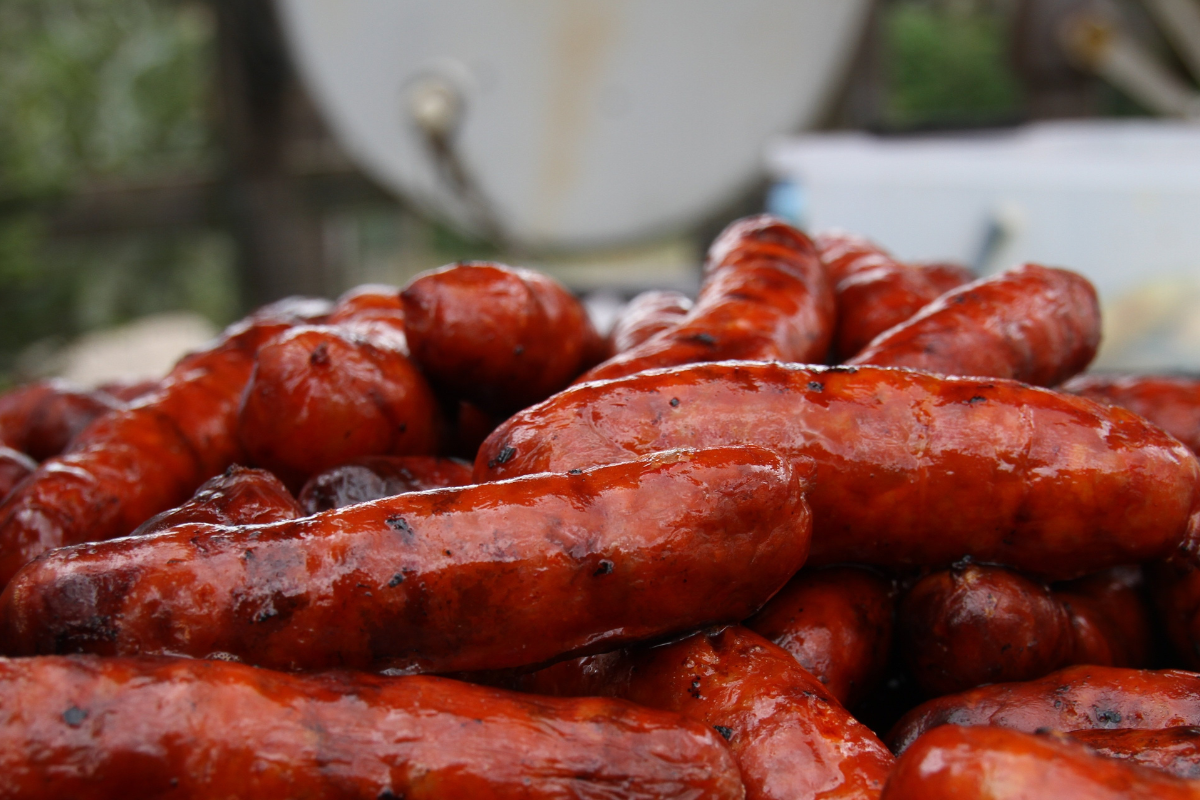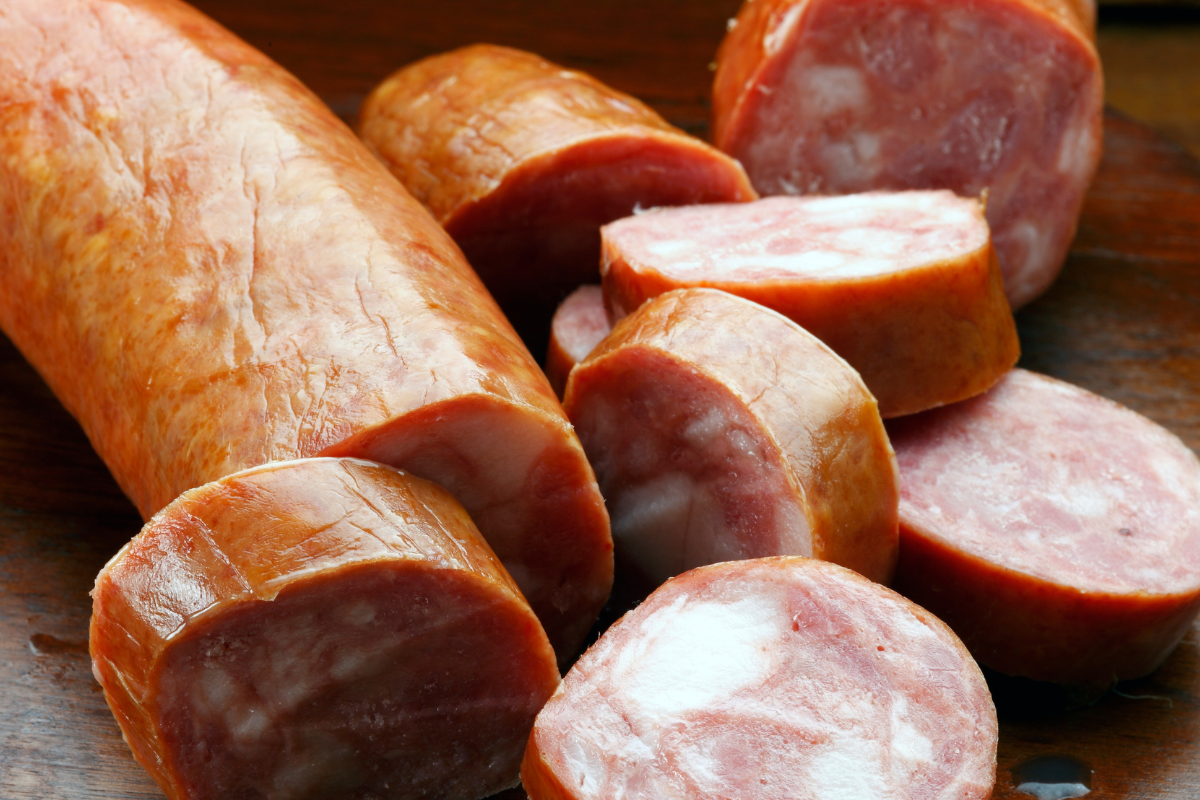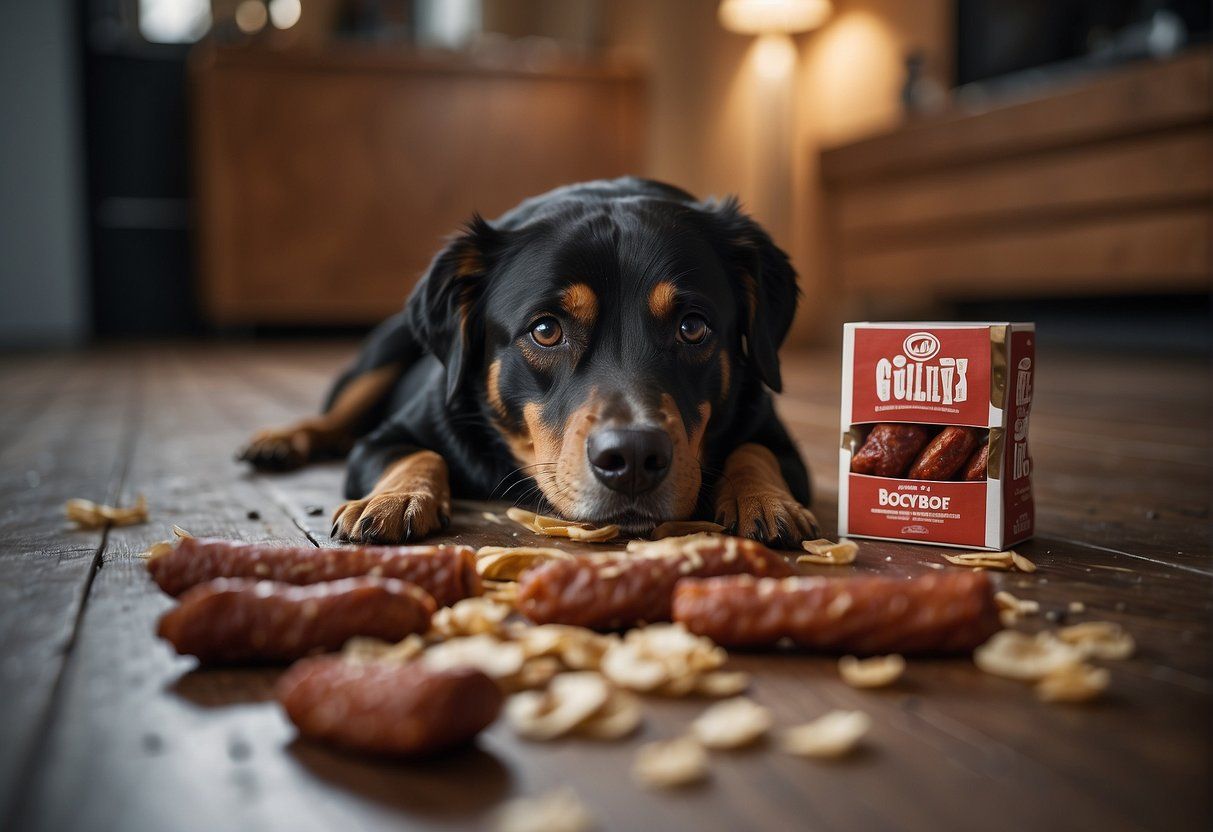Can Dogs Have Chorizo? Is It Safe?
Can Dogs Have Chorizo? Is It Safe?

Vet Reviewed

By: Sarah Hodgson
February 15, 2024
- Posted in Can Dogs EatDogs
Table of Contents
As dog owners, we know that not all human foods are safe for dogs to eat. In general, dogs can eat meat so what about chorizo? Can dogs have chorizo, or is it unsafe for them to eat?
Let's dive in!
While dogs can technically eat chorizo, it is not recommended due to its high fat content and potential for containing toxic ingredients such as garlic and onion. Pet owners should opt for safer and healthier alternatives for their furry friends.
What Is Chorizo?
Chorizo is a type of sausage that originated in Spain and is now popular in many countries around the world. It is made from ground meat, usually pork, but can also be made with beef, chicken, or turkey. The meat is mixed with spices and seasonings, such as garlic, paprika, onion powder, and salt, and then stuffed into a casing made from animal intestines.
Ingredients in Chorizo
The ingredients in chorizo can vary depending on the type of chorizo being made and the region where it is made. However, some common ingredients include:
- Meat: Pork is the most commonly used meat in chorizo, but it can also be made with beef, chicken, or turkey.
- Spices: Garlic, paprika, and onion powder are commonly used spices in chorizo. Other spices, such as cumin, oregano, and red pepper flakes, may also be used.
- Salt: Salt is used to enhance the flavor of the chorizo and to help preserve it.
- Fat: Chorizo is a high-fat sausage, and fat is added to the meat mixture to give it a rich, juicy flavor.
Types of Chorizo
There are many different types of chorizo, each with its own unique flavor and texture. Some of the most common types include:
- Spanish chorizo: This is the most well-known type of chorizo. It is made with smoked paprika, which gives it a distinctive smoky flavor.
- Mexican chorizo: This type of chorizo is made with fresh chili peppers, which gives it a spicy kick.
- Portuguese chorizo: This type of chorizo is made with wine and garlic, which gives it a sweet and tangy flavor.
- Argentine chorizo: This type of chorizo is made with beef and is often served grilled.
So now that we have a better understanding of this spaniard meat delicacy. We need to figure out whether it's safe for dogs to eat.
When it comes to feeding it to dogs, it is important to exercise caution and consult with a veterinarian to ensure that it is safe for your furry friend to consume.

Can Dogs Eat Chorizo?
The answer is not straightforward. While chorizo is not toxic to dogs, it is not a healthy treat either. Chorizo is high in fat, salt, and spices, which can cause digestive issues in dogs. Additionally, the high fat content can lead to obesity and other health problems.
If you want to give your dog a treat, it is best to choose something that is specifically made for dogs and avoid chorizo.
There are many healthy dog treats available that are low in fat and salt and are made with natural ingredients. You can also give your dog small pieces of cooked lean meat, such as chicken or turkey, as a treat.
While dogs can technically eat chorizo, it is not recommended. It is best to choose healthier treats that are specifically made for dogs to avoid any potential health issues.
Health Risks of Chorizo for Dogs
Chorizo is a popular sausage that is commonly used in many dishes. While it may be a tasty treat for humans, it is not recommended for dogs. There are several health risks associated with feeding chorizo to dogs.
Toxic Ingredients
Chorizo often contains ingredients that are toxic to dogs, such as garlic and onion. These ingredients can cause damage to a dog's red blood cells, leading to anemia. Salt is also a common ingredient in chorizo, which can cause sodium ion poisoning in dogs.
High Fat and Sodium Content
Chorizo is a high-fat food that can lead to weight gain and obesity in dogs. Additionally, the high sodium content in chorizo can lead to dehydration and other health issues.
Risk of Pancreatitis
Chorizo is also a high-fat food that can lead to pancreatitis in dogs. Pancreatitis is a condition where the pancreas becomes inflamed, which can cause vomiting, abdominal pain, and lethargy.
Gastrointestinal Upset
Feeding chorizo to dogs can also cause gastrointestinal upset. Dogs may experience diarrhea, vomiting, and abdominal pain after consuming chorizo. These symptoms can be uncomfortable for dogs and may require veterinary attention.
Note
It is important to note that not all dogs will experience the same health risks from consuming chorizo. However, it is generally recommended to avoid feeding chorizo to dogs and opt for safer, dog-friendly treats instead.
What Are The Symptoms of Chorizo Poisoning?
Chorizo is a type of sausage that is made from pork and seasoned with spices. While it can be a tasty treat for humans, it is not recommended for dogs. Dogs have sensitive digestive systems and some of the ingredients in chorizo can cause them harm.
If a dog eats chorizo, they may experience immediate symptoms such as diarrhea and vomiting. These symptoms can be mild or severe depending on the amount of chorizo consumed and the size of the dog. If a dog is experiencing severe symptoms, they should be taken to a veterinarian immediately.
Long-Term Health Effects
In addition to immediate symptoms, chorizo poisoning can also have long-term health effects on dogs. One of the most serious long-term effects is anemia. Chorizo contains high levels of salt and fat, which can lead to Heinz body anemia in dogs. This condition can cause damage to a dog's red blood cells, leading to weakness, lethargy, and even death.
Chorizo can also contribute to high blood pressure and obesity in dogs. These conditions can lead to kidney damage and other serious health problems.
Overall, it is best to avoid giving chorizo to dogs. If a dog does consume chorizo and is experiencing symptoms, it is important to seek veterinary care as soon as possible.
My Dog Ate Chorizo – What Should I Do

If you suspect your dog has eaten chorizo, it is important to act quickly but don't panic. While chorizo is not toxic to dogs, it can cause digestive issues if consumed in large amounts. Here are some steps to take:
- Monitor your dog: Keep an eye on your dog for any signs of discomfort or illness such as vomiting, diarrhea, or lethargy. If you notice any of these symptoms, contact your veterinarian immediately.
- Check the ingredients: If your dog has eaten chorizo, check the ingredients to see if it contains any harmful ingredients such as onions or garlic. These ingredients can be toxic to dogs and should be avoided.
- Adjust their diet: If your dog has consumed a small amount of chorizo, you may be able to adjust their diet to help alleviate any digestive issues. Consider feeding them a bland diet of boiled chicken and rice for a few days.
- Seek veterinary care: If your dog has eaten a large amount of chorizo or is showing severe symptoms, seek veterinary care immediately. Your veterinarian may need to perform tests and provide treatment to help your dog recover.
Remember, prevention is always the best approach. Keep chorizo and other spicy or fatty foods out of reach of your dog to prevent any potential health issues.
When to Contact a Veterinarian
If your dog has consumed chorizo, it is important to monitor them for any signs of illness or discomfort. While chorizo itself is not toxic to dogs, it can still cause digestive issues or allergic reactions in some dogs.
If your dog displays any symptoms such as vomiting, diarrhea, lethargy, loss of appetite, or difficulty breathing, it is important to contact a veterinarian immediately. These symptoms could indicate a more serious illness or poisoning, and prompt veterinary help is crucial.
If you suspect that your dog has ingested a large amount of chorizo or any other potentially toxic substance, do not hesitate to contact a veterinarian. Time is of the essence in cases of poisoning, and prompt treatment can make all the difference in your dog's recovery.
It is always better to be on the side of caution and seek veterinary help if you are unsure about your dog's health. A veterinarian can provide expert advice and treatment to ensure your dog's well-being.
Safe Alternatives to Chorizo
If you're concerned about feeding your dog chorizo, there are plenty of safe alternatives that can provide your furry friend with the necessary nutrients and proteins they need. Here are some recommended options:
Recommended Proteins
Lean proteins such as fish, chicken, and turkey are excellent choices for dogs. They provide essential amino acids, vitamins, and minerals that are necessary for maintaining a healthy diet. Cooked vegetables such as carrots and green beans can also be added to their meals to provide additional nutrients and fiber.
Healthy Fruits and Vegetables
Fruits such as apples and bananas can be a great source of vitamins and fiber for dogs. Blueberries are also a great option as they are high in antioxidants which can help protect against diseases. Vegetables such as cooked sweet potatoes and quinoa are also great additions to their diet.
Appropriate Treats and Snacks
Cottage cheese can be a great source of protein for dogs and can be used as a treat or as a supplement to their meals. Other healthy snack options include small pieces of cooked chicken or turkey, carrots, and green beans.
It's important to remember that while these options are safe and healthy for dogs, it's always best to consult with your veterinarian before making any changes to your dog's diet. They can provide you with specific recommendations based on your dog's individual needs and health concerns.
The Bottom Line
So there you have it, while dogs can technically eat chorizo, it is not recommended. Chorizo is high in fat and salt, which can lead to obesity and other health problems in dogs. Additionally, many types of chorizo contain spices and seasonings that can be harmful to dogs, such as garlic and paprika.
Overall, it is best to stick to dog-friendly foods that are specifically formulated for their nutritional needs. If you have any concerns about what to feed your dog, consult with your veterinarian for personalized advice and guidance.

Subscribe to Petfluence!
Get updates on the latest posts and more from Petfluence straight to your inbox.